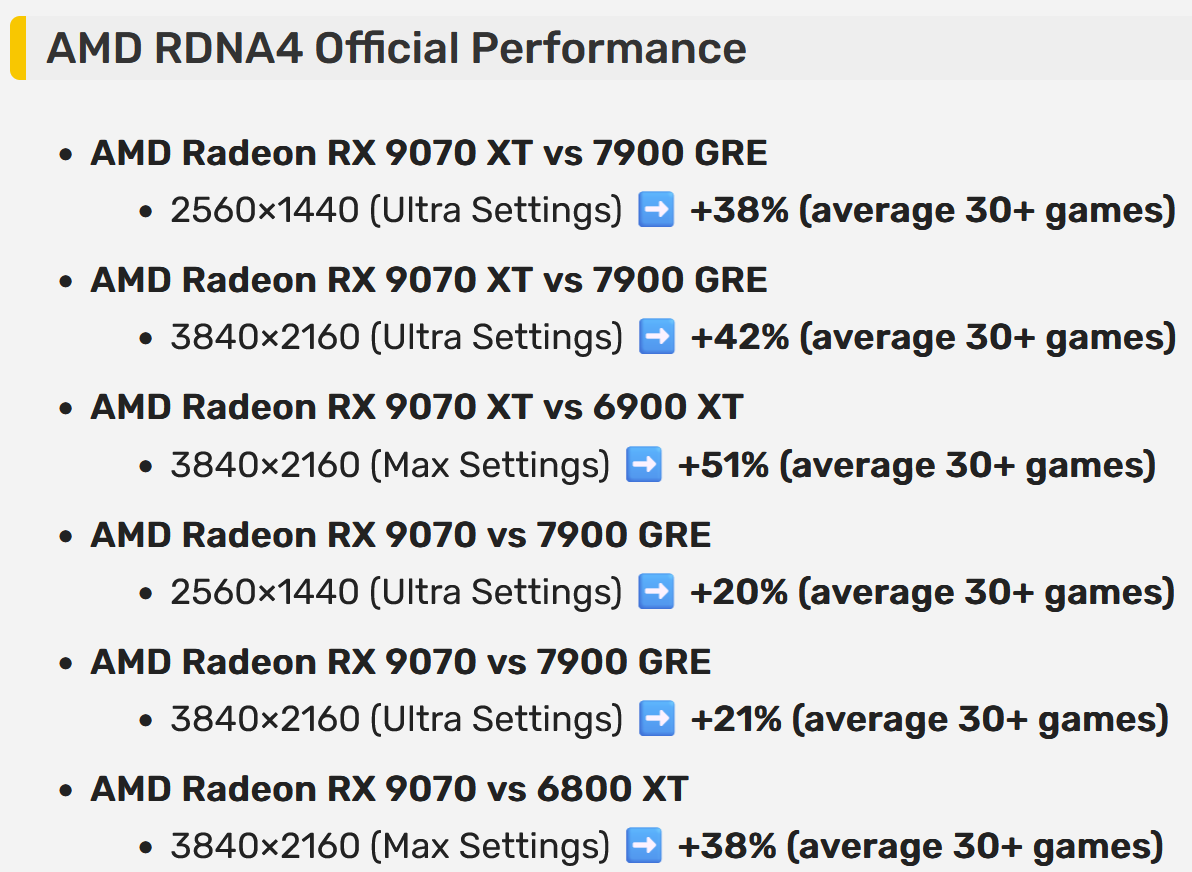- A new performance leak reveals that AMD’s Radeon RX 9070 XT is 42% faster than the RX 7900 GRE at 4K
- Performance results could suggest a potential battle with the previous gen’s flagship RX 7900 XT GPU, and Nvidia’s RTX 5070 Ti
- AMD will reveal its new RDNA 4 GPU lineup on February 28
Nvidia has had its time to win fans over with the RTX 5000 series GPU launch, and things haven’t exactly gone smoothly for Team Green with GPUs shipping with missing ROPs (Render Output Units) and a host of other supply issues. AMD now has an opportunity to take advantage, and a new leak suggests the Radeon RX 9070 XT might do just that.
According to a leaked figure from AMD (pictured below, originally spotted by VideoCardz), the new Radeon RX 9070 XT runs 42% faster than the Radeon RX 7900 GRE at 4K ultra settings across multiple games, hinting at potential competition with Nvidia’s RTX 5070 Ti. The performance gains over the previous generation’s GPU are seen in both raster and ray tracing performance, so the full picture isn’t clear just yet, but it’s certainly promising.
It’s important to note that the RX 7900 GRE is the strongest point of comparison here – none of Nvidia’s RTX 4000 or 5000 series GPUs are used for reference. The GRE was formerly a China-only GPU that was released globally following positive reception, though it’s less powerful than the RX 7900 XT, sitting between Nvidia’s RTX 4070 Super and 4070 Ti in terms of gaming performance. However, based on the suggested 42% performance difference, this could indicate the new RDNA 4 GPU’s position against both the previous flagship RX 7900 XTX and Nvidia’s RTX 5070 Ti.
Team Red will showcase its Radeon RX 9000 series GPU lineup on February 28 in preparation for an early March launch – here, we’ll likely see the pricing of the cards and FSR 4’s full unveiling, which already has some stiff competition in Nvidia’s impressive DLSS 4.
AMD, it’s now or never…
Nvidia is currently facing some backlash over the launch issues surrounding its Blackwell GPUs (as well as the sky-high pricing on the high-end cards), so there’s no better time than now for AMD to capitalize. Hardly any information is available regarding the new Radeon RX 9000 series GPUs – excluding its brief reveal at CES 2025 and a range of leaks and rumors – so there’s plenty of room for surprises.
Team Red has promised upgrades to ray tracing with the RDNA 4 architecture, something its fierce rival Nvidia has essentially mastered at this point. The previous Radeon generation struggled with ray tracing, with the flagship RX 7900 XTX’s raster performance against other cards being the highlight instead, so it’s promising to hear that there will be a greater focus on other improvements with the new Radeon GPU lineup.
To put it lightly, Nvidia is in a bit of a tight spot with a plethora of issues present across all three released GPUs – the RTX 5090, RTX 5070, and RTX 5070 Ti have all been affected by the missing ROPs issue, which won’t sit well with consumers, especially given the high price of admission for those cards. This could give Team Red the momentum required to win fans over, with appealing GPU performance results at affordable prices.
It’s clear that these new GPUs from AMD aren’t supposed to compete at the high end (with the now-debunked 32GB GPU rumor put to bed). But if the RX 9070 XT can compete with Team Green’s RTX 5070 Ti without stock issues and inflated prices, we could have a mid-range winner on our hands.






